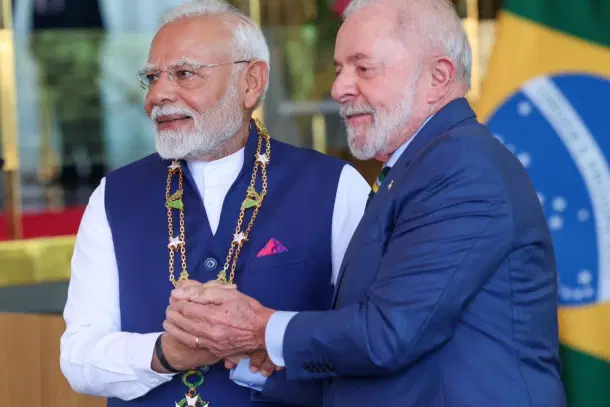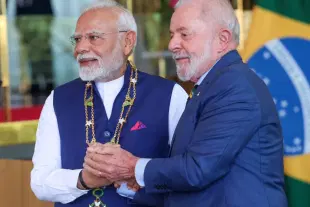News Brief
Modi, Lula Discuss Trade And Defence Cooperation Amid Trump’s 50 Per Cent Tariffs On India And Brazil
Swarajya Staff
Aug 08, 2025, 09:42 AM | Updated 09:42 AM IST
Save & read from anywhere!
Bookmark stories for easy access on any device or the Swarajya app.


In a significant diplomatic move amid escalating US tariff tensions under President Donald Trump, Prime Minister Narendra Modi and Brazilian President Luiz Inácio Lula da Silva engaged in an hour-long telephone conversation on Thursday (7 August).
The call, initiated by Lula, comes hot on the heels of Trump's imposition of 50 per cent tariffs on imports from both India and Brazil, sparking global trade concerns.
According to a statement from the Prime Minister's Office (PMO), the leaders reaffirmed their commitment to elevating the India-Brazil strategic partnership to new heights.
They discussed deepening cooperation in key areas including trade, defence, energy, technology, agriculture, health, and people-to-people ties.
PM Modi thanked Lula for the warm hospitality during his recent visit to Brazil last month, describing it as "memorable and meaningful."
In a post on X (formerly Twitter), PM Modi stated: "Had a good conversation with President Lula. Thanked him for making my visit to Brazil memorable and meaningful. We are committed to deepening our Strategic Partnership including in trade, energy, tech, defence, health and more. A strong, people-centric partnership between Global South nations is vital."
Lula, in his social media update, emphasised defending multilateralism and addressing the "imposition of unilateral tariffs," referring to Trump's policies.
The dialogue also touched on regional and global issues of mutual interest, with both leaders vowing to counter trade challenges through joint efforts.
Current India-Brazil bilateral trade stands at around $12 billion, with projections to reach $15 billion by 2026 if new agreements materialise.
The conversation gains urgency as Trump's tariffs threaten sectors like Indian steel and Brazilian commodities.
This development could lead to enhanced collaborations, including joint ventures in biofuels and defence tech, fostering economic resilience.





